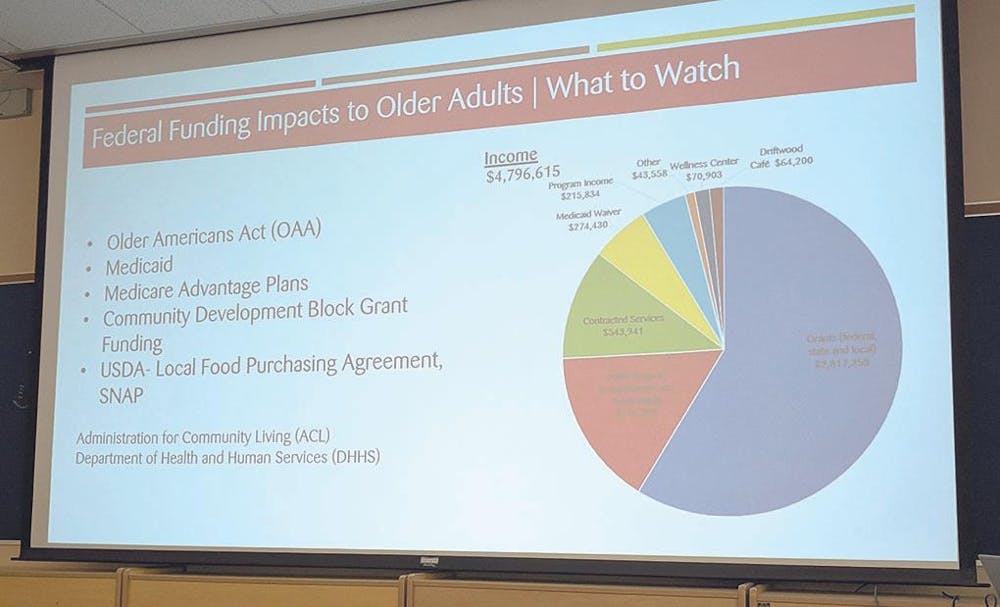WHITEHALL — The Common Ground White Lake group hosted another gathering at the White Lake Community Library Monday evening in its ongoing efforts to share how current events are affecting area people without devolving into a political screaming match.
Monday's meeting focused on the function of local unions and local senior services. Jon Horne, former and future president of the Muskegon Public Schools teachers' union, and Muskegon Community College professor and labor rights advocate Nicholas Budimir spoke on the former topic, with AgeWell executive director Kris VanderStelt discussing the latter.
Horne went over the basics of what a labor union does, citing a "strength in numbers" philosophy; in short, the belief that labor can win better working conditions for its members by banding together than by going it alone. As a public sector (government employees) union, things are slightly different for the teachers' association than for a private sector union, with one major difference being that striking is illegal in the state.
However, the union is able to negotiate many other things - pay scale, class size, and insurance being just a few of them - and Horne was pleased that the most recent contract negotiated was for five years, up from the usual one or two, which saved both sides the trouble of returning to the bargaining table for a while; that contract is up after the 2025-26 school year.
It's not always easy for union members, though. Horne noted the 2018 Supreme Court case Janus v. AFSCME, which held that public sector employees cannot be forced to pay union dues in order to be represented by the union. Because of that, unions in effect must pitch employees on voluntarily contributing, usually with a realistic goal of about 75% participation. Technically, Horne said, if the union fell below 50% in dues-paying membership, the school system (or any other employer in such a scenario) could legally challenge the union's right to exist.
"It was a controversial decision in the public labor movement," Horne said.
Horne also sought to dispel a negative stereotype of unions - that they attempt to cover for poor performance or objectionable behavior in the workplace. Horne summed the union's stance up as, "It is my job to defend your rights. It is not my job to defend your wrongs."
In short, a union will defend any employee's right to due process under a labor agreement with regard to negative consequences or disciplinary actions, but will not stand in the way if that process is followed and an employee is found to be at fault for an action.
Disputes between a union and an employer can and do happen even with an agreement in place, Horne said. Because a base concept in labor relations is that no one (particularly management) wants to go to court, binding arbitration is often set as the final stop for any such dispute if it can't be otherwise resolved.
Budimir also touched on labor relations, sharing graphs that showed how union membership has steadily declined in America over the years while income inequality has grown over the same span. Included in the discussion was a contrast between China's more group-oriented, 'we over me' culture and the U.S.'s more individualistic one. However, Budimir also observed that China's culture goes back thousands of years and is more homogeneous in nature, while the U.S. is a much younger culture with a far more diverse background in many respects.
VanderStelt, the final speaker, delivered remarks about AgeWell services, and particularly how the services the nonprofit provides have been affected by spending decisions at the federal and state levels. Federal and state grants account for about half of AgeWell's budget of just under $4.8 million annually, with additional government support coming from county millage allocations. The group's stated mission is to allow seniors to stay in their homes as long as possible.
It's a budget that's been in flux this year in particular, as uncertainty regarding federal grant distribution led to a preliminary budget deficit of $600,000 for the nonprofit, VanderStelt said. Through various cuts to its nonessential expenses, plus the May closing of the wellness center at Tanglewood Park in Norton Shores, the company managed to lower that deficit to $161,000, and is trying to use more fundraising and further cuts to eliminate the remainder.
VanderStelt said AgeWell has dealt with various uncertainties ever since the onset of the COVID-19 pandemic, saying, "COVID changed us forever." Initial highs, at least from a budgetary perspective - stimulus funding kept AgeWell's services going - were followed by lows - the resulting inflation in the years that followed.
VanderStelt said Meals on Wheels food alone costs around $1 million per year; 1,400 meals per day are delivered, much of it local through a Local Food Purchasing Agreement with the USDA - and no-fault insurance means the fleet of vehicles used to provide that and other services come in at about $10,000 per month to insure. These difficulties have been exacerbated by charitable giving as a whole being down this year, though VanderStelt expressed gratitude that AgeWell's donor retention rate is higher than an average nonprofit's.
These issues will only continue in coming years, as the senior population continues to expand due to the youngest members of the 'baby boom' generation (1946-64) entering retirement age and the U.S. population not replenishing the workforce to keep up.
In the meantime, VanderStelt said, the nonprofit is always seeking new volunteers, particularly driving volunteers to help with Meals on Wheels and driving seniors to non-emergency medical appointments.













